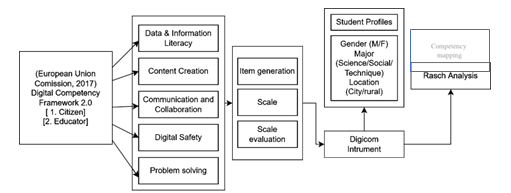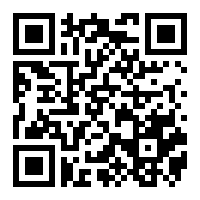Pilot Study of Digital Competency Mapping of Indonesian Preservice Teachers: Rasch Model Analysis
DOI:
https://doi.org/10.23917/ijolae.v7i1.23935Keywords:
competency mapping, digital competency, educational technology, innovative approach, preservice teachers, rasch analysis, science educationAbstract
Typically, biology students pursue natural sciences. As the world becomes increasingly interconnected and reliant on digital technologies and platforms, it is essential to evaluate their technological preparedness. This study aims to validate a mapping instrument of the digital competence of pre-service Biology teachers in a leading private university in Indonesia. The analysis used the Rasch model to measure the validity and reliability of questionnaire instrument utilizing the Logit Value of Item (LVI). The Digital competency (Digcom) questionnaire contains 36 statements in the Indonesian language (Bahasa). This questionnaire aims to record respondents' answers to digital skills for preservice teachers. The statement is adapted from the digital competence area for EU citizens combined with the Digital Literacy guidelines of the Indonesian Ministry of Communication and Information. The result of the retranslation has been validated to remove the ambiguity of each item of the statement by English language experts. The pilot research was conducted on preservice teachers from different backgrounds (gender, department, and year of study) in a private University (n=261). The findings indicated that all the items were deemed acceptable as they met the criteria for the PTMEA-CORR range, MNSQ outfit, and ZSTD outfit. This study is among the few that have explored the digital competency framework of preservice teacher students in Indonesia, specifically in relation to the difficulty level of each competency area.
Downloads
References
Amhag, L., Hellström, L., & Stigmar, M. (2019). Teacher Educators’ Use of Digi-tal Tools and Needs for Digital Compe-tence in Higher Education,. Journal of Digital Learning in Teacher Education, 35(4), 203–220. https://doi.org/10.1080/21532974.2019.1646169
Andriani Kusumaningrum, H. W., & Bayu Dwi Raharya. (2022). Pengukuran Tingkat Kesadaran Keamanan Siber di Kalangan Mahasiswa saat Study From Home dengan Multiple Criteria Decision Analysis (MCDA). Jurnal Ilmiah Sinus (JIS), 20(1).
Annisa, D., Sutrisno, H., Laksono, E., & Yanda, S. (2024). Evaluating Students' Academic Resilience in Chemistry Lear-ning: Insights from a Rasch Model Analysis. Indonesian Journal on Lear-ning and Advanced Education (IJO-LAE), 6(3), 328-349. doi:https://doi.org/10.23917/ijolae.v6i3.23522
Awaludin, A., Prayitno, H. J., & Haq, M. I. (2023a). Using Digital Media During the COVID-19 Pandemic Era: Good Online Program in Higher Education. In-donesian Journal on Learning and Ad-vanced Education, 5(1), 1–12. https://doi.org/10.23917/ijolae.v5i1.19574
Awaludin, A., Prayitno, H. J., & Haq, M. I. (2023b). Using Digital Media During the COVID-19 Pandemic Era: Good Online Program in Higher Education. In-donesian Journal on Learning and Ad-vanced Education, 5(1), 1–12. https://doi.org/10.23917/ijolae.v5i1.19574
Bambang Sumintono & Wahyu Widhiarso. (2014). Rasch model application for so-cial science research. Trim Komunikata Publishing House.
Bond, T. G., & Fox, C. M. (2007). Applying the Rasch Model : Fundamental Measu-rement in the HumBond, T. G., & Fox, C. M. (2007). Applying the Rasch Model : Fundamental Measurement in the Human Sciences Second Edition Uni-versity of Toledo.an Sciences Second Edition University of Toledo.
Cabero-Almenara, J., Barroso-Osuna, J., Palacios-Rodríguez, A., & Llorente-Cejudo, C. (2020). Digital competency frames for university teachers: Evalua-tion through the expert competence coef-ficient. Revista Electronica Interuniver-sitaria de Formacion Del Profesorado, 23(2), 1–18. https://doi.org/10.6018/reifop.413601
Chan, S.-W., Looi, C.-K., & Sumintono, B. (2021). Assessing computational thin-king abilities among Singapore secon-dary students: a Rasch model measure-ment analysis. Journal of Computers in Education, 8(2), 213–236. https://doi.org/10.1007/s40692-020-00177-2
Charlesworth, Tessa E.S., & Banaji, M. R. (2019). Gender in Science, Technology, Engineering, and Mathematics: Issues, Causes, Solutions. The Journal of Neu-roscience, 39(37). https://doi.org/10.1523/JNEUROSCI.0475-18.2019
Creswell, W. J., & Creswell, J. D. (2018). Research Design: Qualitative, Quantita-tive adn Mixed Methods Approaches. In Journal of Chemical Information and Modeling (Vol. 53, Issue 9).
Dutt, S., Phelps, M., & Scott, K. M. (2020). Curricular change and delivery promotes teacher development and engagement. Higher Education Research and Deve-lopment, 0(0), 1–15. https://doi.org/10.1080/07294360.2020.1735314
Ebner, M., & Braun, C. (2020). Emerging Technologies and Pedagogies in the Curriculum (Issue January). Springer Singapore. https://doi.org/10.1007/978-981-15-0618-5
Falloon, G. (2020). From digital literacy to digital competence: the teacher digital competency (TDC) framework. Educa-tional Technology Research and Deve-lopment. https://doi.org/10.1007/s11423-020-09767-4
Fuadi, D., Harsono, H., Syah, M. F. J., Su-silo, A., Suhaili, S., & Wahyono, B. (2021). Self-Governance: Internationali-zation Management of Distinctive Higher Education Towards The World Class University. Indonesian Journal on Learning and Advanced Education (IJOLAE), 3(2), 96–113. https://doi.org/10.23917/ijolae.v3i2.11754
Ghomi, M., & Redecker, C. (2019). Digital competence of educators (DigCompe-du): Development and evaluation of a self-assessment instrument for teachers’ digital competence. CSEDU 2019 - Pro-ceedings of the 11th International Con-ference on Computer Supported Educa-tion, 1.
Gudmundsdottir, G. B., & Hatlevik, O. E. (2018). Newly qualified teachers’ pro-fessional digital competence: implica-tions for teacher education. European Journal of Teacher Education, 41(2), 214–231. https://doi.org/10.1080/02619768.2017.1416085
Hidayat, M. L., Hariyatmi, hariyatmi;, Dwi, setyo astuti;, Sumintono, B., Meccawy, M., & Khanzada, T. J. S. (2023). Digital Competencies Mapping Dataset of Pre-service Teachers in Indonesia. In da-ta.mendeley.com. Mendeley Data. https://doi.org/10.17632/5kwtxjrbzg.2
Iivari, N., Sharma, S., & Ventä-Olkkonen, L. (2020). Digital transformation of everyday life – How COVID-19 pan-demic transformed the basic education of the young generation and why informa-tion management research should care? International Journal of Information Management, June, 102183. https://doi.org/10.1016/j.ijinfomgt.2020.102183
Instefjord, E. J., & Munthe, E. (2017). Edu-cating digitally competent teachers: A study of integration of professional digi-tal competence in teacher education. Teaching and Teacher Education, 67, 37–45. https://doi.org/10.1016/j.tate.2017.05.016
Kay, R. (2006). Evaluating strategies used to incorporate technology into pre-service educa-tion: A review of the literature. Journal of Research on Technology in Education, 38, 383–408.
Kuzminska, O., Mazorchuk, M., Morze, N., Pavlenko, V., & Prokhorov, A. (2018). Digital competency of the students and teachers in Ukraine: Measurement, analysis, development prospects. CEUR Workshop Proceedings, 2104, 366–379.
Linacre, M. (2012). Winsteps Rasch Tutorial 2 Mike Linacre , instructor – June 2012 A . Liking for Science - the control and data file (Issue June).
Mynaříková, L., & Novotný, L. (2021). The current challenges of further education in ict with the example of the Czech Re-public. Sustainability (Switzerland), 13(8). https://doi.org/10.3390/su13084106
Rhenald, K. (2017). Disruption (6th ed.). PT Gramedia Pustaka Utama.
Røkenes, F. M., & Krumsvik, R. J. (2014). Development of student teachers’ digital competence in teacher education. Nordic Journal of Digital Literacy, 2014(4), 250–280.
Rusland, S. L., Jaafar, N. I., & Sumintono, B. (2020). Evaluating knowledge crea-tion processes in the Royal Malaysian Navy (RMN) fleet: Personnel conceptu-alization, participation and differences. Cogent Business and Management, 7(1), 0–25. https://doi.org/10.1080/23311975.2020.1785106
Soler-Costa, R., Lafarga-Ostáriz, P., Mauri-Medrano, M., & Moreno-Guerrero, A. J. (2021). Netiquette: Ethic, education, and behavior on internet—a systematic literature review. International Journal of Environmental Research and Public Health, 18(3), 1–15. https://doi.org/10.3390/ijerph18031212
Sudjana, S. (2022). The Effectiveness of Combating Piracy of Copyright In The Perspective Of The Legal System. Res Nullius Law Journal, 4(1), 77–99. https://doi.org/10.34010/rnlj.v4i1.5939
Tondeur, J., Siddiq, F., Scherer, R., & Baran, E. (2017). Exploring the link between pre- service teachers ’ ICT- related profi-les and their TPACK.
Tsybulsky, D., & Levin, I. (2019). Science teachers’ worldviews in the age of the digital revolution: Structural and content analysis. Teaching and Teacher Education, 86, 102921. https://doi.org/10.1016/j.tate.2019.102921
UNESCO. (2018). A Global Framework of Reference on Digital Literacy. Informa-tion Paper, 51(51), 1–146. Varga, K., & Egervári, D. (2014). Curriculum framework for the development of in-formation literacy: Methodological is-sues based on hungarian experiences. Communications in Computer and In-formation Science, 492, 504–511. https://doi.org/10.1007/978-3-319-14136-7_53
Voogt, J., Erstad, O., Dede, C., & Mishra, P. (2013). Challenges to learning and schooling in the digital networked world of the 21st century. Journal of Compu-ter Assisted Learning, 29(5), 403–413. https://doi.org/10.1111/jcal.12029
Wild, S., & Schulze Heuling, L. (2021). Re-evaluation of the D21-digital-index as-sessment instrument for measuring higher-level digital competences. Studies in Educational Evaluation, 68(February), 100981. https://doi.org/10.1016/j.stueduc.2021.100981
William J. Boone. (2016). Rasch Analysis for Instrument Development: Why, When, and How? CBE Life Sciences Education, 15(4). https://doi.org/https://doi.org/10.1187/cbe.16-04-0148

Submitted
Published
Issue
Section
License
Copyright (c) 2025 Muhammad Luthfi Hidayat, Shemsu Gulta Abdurahman, Dwi Setyo Astuti, Ratna Prabawati, Sofyan Anif, Hariyatmi Hariyatmi, Fathul Zannah

This work is licensed under a Creative Commons Attribution 4.0 International License.












